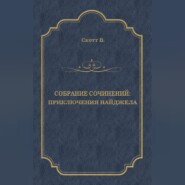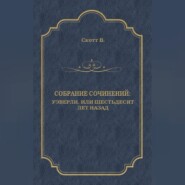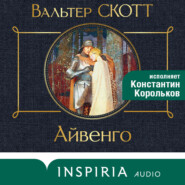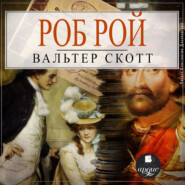По всем вопросам обращайтесь на: info@litportal.ru
(©) 2003-2024.
✖
Chronicles of the Canongate, 1st Series
Настройки чтения
Размер шрифта
Высота строк
Поля
when I should have a cottage with a small library, a small cellar, a spare bed for a friend, and live more happy and more honoured than when I had the whole barony. But the sight of Castle Treddles had disturbed all my own castles in the air. The realities of the matter, like a stone plashed into a limpid fountain, had destroyed the reflection of the objects around, which, till this act of violence, lay slumbering on the crystal surface, and I tried in vain to re-establish the picture which had been so rudely broken. Well, then, I would try it another way. I would try to get Christie Steele out of her PUBLIC, since she was not striving in it, and she who had been my mother’s governante should be mine. I knew all her faults, and I told her history over to myself.
She was grand-daughter, I believe – at least some relative – of the famous Covenanter of the name, whom Dean Swift’s friend, Captain Creichton, shot on his own staircase in the times of the persecutions; [See Note 2. – Steele a Covenanter, shot by Captain Creichton.] and had perhaps derived from her native stock much both of its good and evil properties. No one could say of her that she was the life and spirit of the family, though in my mother’s time she directed all family affairs. Her look was austere and gloomy, and when she was not displeased with you, you could only find it out by her silence. If there was cause for complaint, real or imaginary, Christie was loud enough. She loved my mother with the devoted attachment of a younger sister; but she was as jealous of her favour to any one else as if she had been the aged husband of a coquettish wife, and as severe in her reprehensions as an abbess over her nuns. The command which she exercised over her was that, I fear, of a strong and determined over a feeble and more nervous disposition and though it was used with rigour, yet, to the best of Christie Steele’s belief, she was urging her mistress to her best and most becoming course, and would have died rather than have recommended any other. The attachment of this woman was limited to the family of Croftangry; for she had few relations, and a dissolute cousin, whom late in life she had taken as a husband, had long left her a widow.
To me she had ever a strong dislike. Even from my early childhood she was jealous, strange as it may seem, of my interest in my mother’s affections. She saw my foibles and vices with abhorrence, and without a grain of allowance; nor did she pardon the weakness of maternal affection even when, by the death of two brothers, I came to be the only child of a widowed parent. At the time my disorderly conduct induced my mother to leave Glentanner, and retreat to her jointure-house, I always blamed Christie Steele for having influenced her resentment and prevented her from listening to my vows of amendment, which at times were real and serious, and might, perhaps, have accelerated that change of disposition which has since, I trust, taken place. But Christie regarded me as altogether a doomed and predestinated child of perdition, who was sure to hold on my course, and drag downwards whosoever might attempt to afford me support.
Still, though I knew such had been Christie’s prejudices against me in other days, yet I thought enough of time had since passed away to destroy all of them. I knew that when, through the disorder of my affairs, my mother underwent some temporary inconvenience about money matters, Christie, as a thing of course, stood in the gap, and having sold a small inheritance which had descended to her, brought the purchase money to her mistress, with a sense of devotion as deep as that which inspired the Christians of the first age, when they sold all they had, and followed the apostles of the church. I therefore thought that we might, in old Scottish phrase, “let byganes be byganes,” and begin upon a new account. Yet I resolved, like a skilful general, to reconnoitre a little before laying down any precise scheme of proceeding, and in the interim I determined to preserve my incognito.
CHAPTER IV. MR. CROFTANGRY BIDS ADIEU TO CLYDESDALE
Alas, how changed from what it once had been!
‘Twas now degraded to a common inn.
GAY.
An hour’s brisk walking, or thereabouts, placed me in front of Duntarkin, which had also, I found, undergone considerable alterations, though it had not been altogether demolished like the principal mansion. An inn-yard extended before the door of the decent little jointure-house, even amidst the remnants of the holly hedges which had screened the lady’s garden. Then a broad, raw-looking, new-made road intruded itself up the little glen, instead of the old horseway, so seldom used that it was almost entirely covered with grass. It is a great enormity, of which gentlemen trustees on the highways are sometimes guilty, in adopting the breadth necessary for an avenue to the metropolis, where all that is required is an access to some sequestered and unpopulous district. I do not say anything of the expense – that the trustees and their constituents may settle as they please. But the destruction of silvan beauty is great when the breadth of the road is more than proportioned to the vale through which it runs, and lowers, of course, the consequence of any objects of wood or water, or broken and varied ground, which might otherwise attract notice and give pleasure. A bubbling runnel by the side of one of those modern Appian or Flaminian highways is but like a kennel; the little hill is diminished to a hillock – the romantic hillock to a molehill, almost too small for sight.
Such an enormity, however, had destroyed the quiet loneliness of Duntarkin, and intruded its breadth of dust and gravel, and its associations of pochays and mail-coaches, upon one of the most sequestered spots in the Middle Ward of Clydesdale. The house was old and dilapidated, and looked sorry for itself, as if sensible of a derogation; but the sign was strong and new, and brightly painted, displaying a heraldic shield (three shuttles in a field diapre), a web partly unfolded for crest, and two stout giants for supporters, each one holding a weaver’s beam proper. To have displayed this monstrous emblem on the front of the house might have hazarded bringing down the wall, but for certain would have blocked up one or two windows. It was therefore established independent of the mansion, being displayed in an iron framework, and suspended upon two posts, with as much wood and iron about it as would have builded a brig; and there it hung, creaking, groaning, and screaming in every blast of wind, and frightening for five miles’ distance, for aught I know, the nests of thrushes and linnets, the ancient denizens of the little glen.
When I entered the place I was received by Christie Steele herself, who seemed uncertain whether to drop me in the kitchen, or usher me into a separate apartment, as I called for tea, with something rather more substantial than bread and butter, and spoke of supping and sleeping, Christie at last inducted me into the room where she herself had been sitting, probably the only one which had a fire, though the month was October. This answered my plan; and as she was about to remove her spinning-wheel, I begged she would have the goodness to remain and make my tea, adding that I liked the sound of the wheel, and desired not to disturb her housewife thrift in the least.
“I dinna ken, sir,” she replied, in a dry, REVECHE tone, which carried me back twenty years, “I am nane of thae heartsome landleddies that can tell country cracks, and make themsel’s agreeable, and I was ganging to put on a fire for you in the Red Room; but if it is your will to stay here, he that pays the lawing maun choose the lodging.”
I endeavoured to engage her in conversation; but though she answered, with a kind of stiff civility, I could get her into no freedom of discourse, and she began to look at her wheel and at the door more than once, as if she meditated a retreat. I was obliged, therefore, to proceed to some special questions; that might have interest for a person whose ideas were probably of a very bounded description.
I looked round the apartment, being the same in which I had last seen my poor mother. The author of the family history, formerly mentioned, had taken great credit to himself for the improvements he had made in this same jointure-house of Duntarkin, and how, upon his marriage, when his mother took possession of the same as her jointure-house, “to his great charges and expenses he caused box the walls of the great parlour” (in which I was now sitting), “empanel the same, and plaster the roof, finishing the apartment with ane concave chimney, and decorating the same with pictures, and a barometer and thermometer.” And in particular, which his good mother used to say she prized above all the rest, he had caused his own portraiture be limned over the mantlepiece by a skilful hand. And, in good faith, there he remained still, having much the visage which I was disposed to ascribe to him on the evidence of his handwriting, – grim and austere, yet not without a cast of shrewdness and determination; in armour, though he never wore it, I fancy; one hand on an open book, and one resting on the hilt of his sword, though I dare say his head never ached with reading, nor his limbs with fencing.
“That picture is painted on the wood, madam,” said I.
“Ay, sir, or it’s like it would not have been left there; they look a’ they could.”
“Mr. Treddles’s creditors, you mean?” said I.
“Na,” replied she dryly, “the creditors of another family, that sweepit cleaner than this poor man’s, because I fancy there was less to gather.”
“An older family, perhaps, and probably more remembered and regretted than later possessors?”
Christie here settled herself in her seat, and pulled her wheel towards her. I had given her something interesting for her thoughts to dwell upon, and her wheel was a mechanical accompaniment on such occasions, the revolutions of which assisted her in the explanation of her ideas.
“Mair regretted – mair missed? I liked ane of the auld family very weel, but I winna say that for them a’. How should they be mair missed than the Treddleses? The cotton mill was such a thing for the country! The mair bairns a cottar body had the better; they would make their awn keep frae the time they were five years auld, and a widow wi’ three or four bairns was a wealthy woman in the time of the Treddleses.”
“But the health of these poor children, my good friend – their education and religious instruction – ”
“For health,” said Christie, looking gloomily at me, “ye maun ken little of the warld, sir, if ye dinna ken that the health of the poor man’s body, as well as his youth and his strength, are all at the command of the rich man’s purse. There never was a trade so unhealthy yet but men would fight to get wark at it for twa pennies a day aboon the common wage. But the bairns were reasonably weel cared for in the way of air and exercise, and a very responsible youth heard them their Carritch, and gied them lessons in Reediemadeasy [“Reading made Easy,” usually so pronounced in Scotland.] Now, what did they ever get before? Maybe on a winter day they wad be called out to beat the wood for cocks or siclike; and then the starving weans would maybe get a bite of broken bread, and maybe no, just as the butler was in humour – that was a’ they got.”
“They were not, then, a very kind family to the poor, these old possessors?” said I, somewhat bitterly; for I had expected to hear my ancestors’ praises recorded, though I certainly despaired of being regaled with my own.
“They werena ill to them, sir, and that is aye something. They were just decent bien bodies; ony poor creature that had face to beg got an awmous, and welcome – they that were shamefaced gaed by, and twice as welcome. But they keepit an honest walk before God and man, the Croftangrys, and, as I said before, if they did little good, they did as little ill. They lifted their rents, and spent them; called in their kain and ate them; gaed to the kirk of a Sunday; bowed civilly if folk took aff their bannets as they gaed by, and lookit as black as sin at them that keepit them on.”
“These are their arms that you have on the sign?”
“What! on the painted board that is skirling and groaning at the door? Na, these are Mr. Treddles’s arms though they look as like legs as arms. Ill pleased I was at the fule thing, that cost as muckle as would hae repaired the house from the wa’ stane to the rigging-tree. But if I am to bide here, I’ll hae a decent board wi’ a punch bowl on it.”
“Is there a doubt of your staying here, Mrs. Steele?”
“Dinna Mistress me,” said the cross old woman, whose fingers were now plying their thrift in a manner which indicated nervous irritation; “there was nae luck in the land since Luckie turned Mistress, and Mistress my Leddy. And as for staying here, if it concerns you to ken, I may stay if I can pay a hundred pund sterling for the lease, and I may flit if I canna, and so gude e’en to you, Christie,” – and round went the wheel with much activity.
“And you like the trade of keeping a public-house?”
“I can scarce say that,” she replied. “But worthy Mr. Prendergast is clear of its lawfulness; and I hae gotten used to it, and made a decent living, though I never make out a fause reckoning, or give ony ane the means to disorder reason in my house.”
“Indeed!” said I; “in that case, there is no wonder you have not made up the hundred pounds to purchase the lease.”
“How do you ken,” said she sharply, “that I might not have had a hundred punds of my ain fee? If I have it not, I am sure it is my ain faut. And I wunna ca’ it faut neither, for it gaed to her wha was weel entitled to a’ my service.” Again she pulled stoutly at the flax, and the wheel went smartly round.
“This old gentleman,” said I, fixing my eye on the painted panel, “seems to have had HIS arms painted as well as Mr. Treddles – that is, if that painting in the corner be a scutcheon.”
“Ay, ay – cushion, just sae. They maun a’ hae their cushions – there’s sma’ gentry without that – and so the arms, as they ca’ them, of the house of Glentanner may be seen on an auld stane in the west end of the house. But to do them justice; they didna propale sae muckle about them as poor Mr. Treddles did – it’s like they were better used to them.”
“Very likely. Are there any of the old family in life, goodwife?”
“No,” she replied; then added; after a moment’s hesitation, “Not that I know of” – and the wheel, which had intermitted, began again to revolve.
“Gone abroad, perhaps?” I suggested.
She now looked up, and faced me. “No, sir. There were three sons of the last laird of Glentanner, as he was then called. John and William were hopeful young gentlemen, but they died early – one of a decline brought on by the mizzles, the other lost his life in a fever. It would hae been lucky for mony ane that Chrystal had gane the same gate.”
“Oh, he must have been the young spendthrift that sold the property? Well, but you should you have such an ill-will against him; remember necessity has no law. And then, goodwife, he was not more culpable than Mr. Treddles, whom you are so sorry for.”
“I wish I could think sae, sir, for his mother’s sake. But Mr. Treddles was in trade, and though he had no preceese right to do so, yet there was some warrant for a man being expensive that imagined he was making a mint of money. But this unhappy lad devoured his patrimony, when he kenned that he was living like a ratten in a Dunlap cheese, and diminishing his means at a’ hands. I canna bide to think on’t.” With this she broke out into a snatch of a ballad, but little of mirth was there either in the tone or the expression: —
“For he did spend, and make an end
Of gear that his forefathers wan;
Of land and ware he made him bare,
So speak nae mair of the auld gudeman.”
“Come, dame,” said I, “it is a long lane that has no turning. I will not keep from you that I have heard something of this poor fellow, Chrystal Croftangry. He has sown his wild oats, as they say, and has settled into a steady, respectable man.”
“And wha tell’d ye that tidings?” said she, looking sharply at me.
“Not, perhaps, the best judge in the world of his character, for it was himself, dame.”
“And if he tell’d you truth, it was a virtue he did not aye use to practise,” said Christie.
“The devil!” said I, considerably nettled; “all the world held him to be a man of honour.”
“Ay, ay! he would hae shot onybody wi’ his pistols and his guns that had evened him to be a liar. But if he promised to pay an honest tradesman the next term-day, did he keep his word then? And if he promised a puir, silly lass to make gude her shame, did he speak truth then? And what is that but being a liar, and a black-hearted, deceitful liar to boot?”
My indignation was rising, but I strove to suppress it; indeed, I should only have afforded my tormentor a triumph by an angry reply. I partly suspected she began to recognize me, yet she testified so little emotion that I could not think my suspicion well founded. I went on, therefore, to say, in a tone as indifferent as I could command, “Well, goodwife, I see you will believe no good of this Chrystal of yours, till he comes back and buys a good farm on the estate, and makes you his housekeeper.”

















